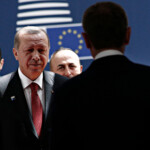‘Given the present environment of censorship and the ongoing attempts to silence remaining independent media in Turkey, it was not all surprising, to see the response of the head of the Directorate for Communications, Fahrettin Altun, who was quick to label the Reuters report as “disinformation” and “perception operation.”’
On June 26, Reuters, published a report, implicating Bilal Erdoğan, 42, the son of Turkey’s President Recep Tayyip Erdoğan, in a corruption scandal. The following day, 47 tweets, 45 news links, and one YouTube video which shared or re-published the story were blocked for access on grounds of violating personal rights.
The Directorate of Communications, slammed the report as baseless, calling it disinformation. Bilal Erdoğan, through a lawyer, called the investigation, “a web of lies.”
The practice of blocking content about corruption or irregularities in due process in Turkey is common. By some estimates, close to half of the blocked news is directly related to the Turkish President and Justice and Development Party (AKP) leader Recep Tayyip Erdoğan, his family, or AKP mayors and officials.
In 2016, Wikileaks came under digital attack after the site published over 300,000 emails between AKP officials. In June 2020, access to entries about First Lady Emine Erdoğan’s Hermes handbag on the popular website Ekşi Sözlük (Sour Dictionary), a user-contribution-based collaborative hypertext dictionary, were blocked by a court order.
In 2021, articles about the former finance minister and the son-in-law of President Recep Tayyip Erdoğan, Berat Albayrak, and two other Albayrak family members, were blocked because they were a “violation of personal rights.”
In 2022, access to some 130 news reports were blocked for access upon request of President Erdoğan’s former lawyer. In August 2022, a story titled “Economist Erdoğan” was blocked for access on the grounds the story was an “attack on personal rights.”
Also in 2022, news items that featured the drawings by Brazilian cartoonist Latuff of President Erdoğan were blocked for access because they were a “violation of personal rights.” These are just a handful of examples of cases in which content mentioning the family, the president, or party members was censored.
Turkey has also blocked access to popular platforms like YouTube, Wikipedia, and Twitter over the years. As recently as February 2023, the practice of blocking platforms continues.
Meanwhile, journalists exposing corruption or government-related investigations often face jail time and persecution. Reuter’s report about the alleged corruption scheme mentioning President Erdoğan’s family member is not the first to mention the president’s son in a graft story.
Bilal Erdoğan’s name previously appeared in a graft scandal in 2016. At the time, his name was associated with a money-laundering probe in Italy. The accusations leveled against Bilal were eventually dropped due to a lack of evidence. In 2014, a series of leaked audio recordings between Bilal and his father, discussing how to dispose of tens of millions of foreign currency cash, were also dismissed as fake. The foundations where Bilal Erdoğan is a board member have also been in the spotlight of investigative journalists.
Reuters’ recent investigation revolves around a Swedish affiliate of an American company — Dignita Systems AB — that sells “dashboard breathalyzers that lock a vehicle’s ignition when the driver is inebriated.” Bilal Erdoğan was to lobby his father’s administration to boost the sales of the product in Turkey. In return, the company “would pay tens of millions of dollars in lobbying fees, via a shell company, to two institutions — the Ibn Haldun University and the TÜGVA youth foundation — for which Bilal Erdoğan is a board member.” The deal never materialized according to the investigation.
In 2021, TÜGVA found itself in the midst of a corruption and abuse of power scandal. The journalist who broke the story, Metin Cihan, and the informant, Ramazan Aydoğdu, who leaked the documents, were put on trial over charges of leaking internal documents.
According to reporting, “the documents revealed widespread corruption within the organization, including the streamlining of Foundation members into high-ranking, highly-paid government roles, as well as the extensive aid and property granted to the organization from the government.” Cihan, who lives abroad, is facing up to six years while Aydoğdu is facing up to ten and a half years behind bars in the ongoing trial.
TÜGVA is among other government-linked foundations, which have reportedly benefited from generous government subsidies. TÜGVA was set up in 2013 and was granted tax-exempt status in October 2016.
Another foundation where Bilal Erdoğan is a board member is the Service for Youth and Education Foundation of Turkey (TÜRGEV). The foundation’s name has been in and out of the media spotlight over the years.
Most recently, in May 2022, the foundations affiliated with the President were accused of aiding the President in siphoning money overseas. In 2019, Istanbul municipality released a report documenting how TÜGVA, and TÜRGEV received generous sums — EUR 11.3 million and EUR 8 million — respectively from the Istanbul city administration’s budget. When the newly elected Istanbul Mayor Ekrem İmamoğlu tried addressing this waste on CNN Turk, a television channel closely affiliated with the ruling government, he was cut off air.
In the aftermath of the devastating earthquake that hit Turkey’s provinces in February 2023, the ruling government in an attempt to control the criticism of the state following its inadequate response to the earthquake-affected areas, went on an arrest spree and turned to internet restrictions.
There was also the “the Disinformation Reporting Service” app launched by the directorate of communications encouraging the public to download the app and report “manipulative” news reports and social media posts.
In October 2022, Turkish lawmakers approved a bill on disinformation which the local civil society organizations described as underhanded censorship used to squash dissent and criticism.
There were a number of concerning new restrictions in the bill — mandatory content removal, violations of user privacy, further platform regulation measures, and more — though one of the most worrying articles was Article 29, according to which “anyone publicly distributing false information on Turkey’s domestic and external security, public order and welfare could face between one and three years in jail for instigating concern, fear and panic in society, faces imprisonment from one and up to three years.”
Given the present environment of censorship and the ongoing attempts to silence remaining independent media in Turkey, it was not all surprising, to see the response of the head of the Directorate for Communications, Fahrettin Altun, who was quick to label the Reuters report as “disinformation” and “perception operation.”
In a long Tweet, Altun described Reuters and its report as, a “pitiful example of a 171-year-old media organisation publicly humiliating itself.” He also questioned “the journalistic standards” of Reuters and the network’s “journalism ethics.”
This article was originally published by GlobalVoices.
The views and opinions expressed above are the author’s and do not reflect those of the Free Turkish Press.


